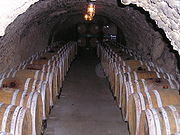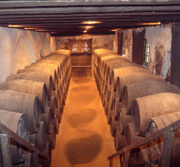
Wine cellar
Encyclopedia

Wine
Wine is an alcoholic beverage, made of fermented fruit juice, usually from grapes. The natural chemical balance of grapes lets them ferment without the addition of sugars, acids, enzymes, or other nutrients. Grape wine is produced by fermenting crushed grapes using various types of yeast. Yeast...
in bottles or barrels, or more rarely in carboy
Carboy
A carboy is a rigid container with a typical capacity of 5 to 15 gallons . Carboys are primarily used for transporting fluids, often water or chemicals.They are also used for in-home fermentation of beverages, often wine.-Brewing:...
s, amphora
Amphora
An amphora is a type of vase-shaped, usually ceramic container with two handles and a long neck narrower than the body...
e or plastic containers. In an active wine cellar, important factors such as temperature and humidity are maintained by a climate control system. In contrast, passive wine cellars are not climate-controlled, and are usually built underground to reduce temperature swings. An aboveground wine cellar is often called a wine room, while a small wine cellar (less than 500 bottles) is sometimes termed a wine closet.
Purpose
Wine cellars protect alcoholic beverages from potentially harmful external influences, providing darknessDarkness
Darkness, in contrast with brightness, is a relative absence of visible light. It is the appearance of black in a color space. When light is not present, rod and cone cells within the eye are not stimulated. This lack of stimulation means photoreceptor cells are unable to distinguish color...
and a constant temperature
Temperature
Temperature is a physical property of matter that quantitatively expresses the common notions of hot and cold. Objects of low temperature are cold, while various degrees of higher temperatures are referred to as warm or hot...
. Wine is a natural, perishable food product. Left exposed to heat, light, vibration or fluctuations in temperature and humidity
Humidity
Humidity is a term for the amount of water vapor in the air, and can refer to any one of several measurements of humidity. Formally, humid air is not "moist air" but a mixture of water vapor and other constituents of air, and humidity is defined in terms of the water content of this mixture,...
, all types of wine can spoil. When properly stored, wines not only maintain their quality but many actually improve in aroma, flavor, and complexity as they mature.
Conditions

Wine cave
Wine caves are subterranean structures for the storage and aging of wine. They are an integral component of the wine industry world wide. The design and construction of wine caves represents a unique application of underground construction techniques....
used to store wine in France, is ideal for both short-term storage and long-term aging of wine. Note that wine generally matures differently and more slowly at a lower temperature than it does at a higher temperature. When the temperature swings are significant, 14 degrees or more, it will cause the wine to breathe through the cork which significantly speeds up the aging process. Between 10–14 °C (50–57.2 F), wines will age normally.
Active versus passive
Wine cellars can be either active or passively cooled. Active wine cellars are highly insulatedThermal insulation
Thermal insulation is the reduction of the effects of the various processes of heat transfer between objects in thermal contact or in range of radiative influence. Heat transfer is the transfer of thermal energy between objects of differing temperature...
and need to be properly constructed. They require specialized wine cellar conditioning
Air conditioning
An air conditioner is a home appliance, system, or mechanism designed to dehumidify and extract heat from an area. The cooling is done using a simple refrigeration cycle...
and cooling systems to maintain the desired temperature and humidity. In a very dry climate, it may be necessary to actively humidify the air, but in most areas this is not necessary. Passive wine cellars must be located in naturally cool and damp areas with minor seasonal and diurnal temperature variations—for example, a basement in a temperate climate. Passive cellars may be less predictable, but cost nothing to operate and are not affected by power outage
Power outage
A power outage is a short- or long-term loss of the electric power to an area.There are many causes of power failures in an electricity network...
s.
Debate on humidity
Some wine experts debate the importance of humidity for proper wine storage. In the Wine SpectatorWine Spectator
Wine Spectator is a lifestyle magazine that focuses on wine and wine culture. It publishes 15 issues per year with content that includes news, articles, profiles, and general entertainment pieces...
, writer Matt Kramer noted a French
France
The French Republic , The French Republic , The French Republic , (commonly known as France , is a unitary semi-presidential republic in Western Europe with several overseas territories and islands located on other continents and in the Indian, Pacific, and Atlantic oceans. Metropolitan France...
study which claimed that the relative humidity
Relative humidity
Relative humidity is a term used to describe the amount of water vapor in a mixture of air and water vapor. It is defined as the partial pressure of water vapor in the air-water mixture, given as a percentage of the saturated vapor pressure under those conditions...
within a bottle is maintained 100% regardless of the closure used or the orientation of the bottle. However, Alexis Lichine
Alexis Lichine
Alexis Lichine was a Russian wine writer and entrepreneur. He played a key role in promoting varietal labelling of wine, was a masterful salesman of wine, and owned Château Prieuré-Lichine and a share of Château Lascombes in the Médoc. He was married to actress Arlene Dahl from 1964 to...
says that low humidity can be a problem because it may cause organic corks to dry prematurely. An inch of gravel covering the floor periodically sprinkled with a little water was recommended to retain the desired humidity.

